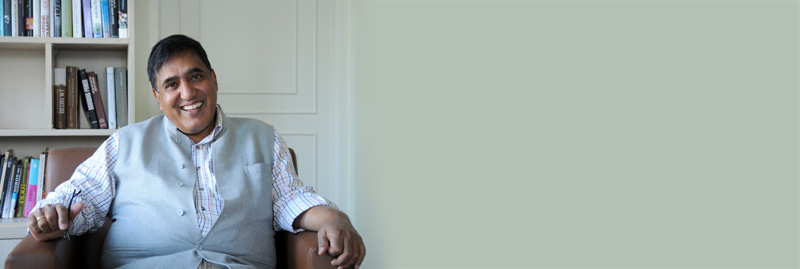
OR
Book Chat

Former advisor to President Yadav, Hari Sharma reveals that, of late, he isn’t only picking books for its content matter or writer but also aesthetic value. Fonts, bindings, cover, size, he talks about them all and also reflects that it might sound slightly unusual. Nevertheless, he is thoroughly enjoying the process of locating and the prospect of owning such literary finds.
Apparently, so far he has collected around 75 of the 150 western antiquity classical series published by Harvard University and even owns all 10 of Murti Collection’s regional Indian classic literature, a series for which they had designed their own unique special font. He names these as the most beautiful and valuable books in his possession so far. He also refers to them as his companions.
Books are his passion and reading is an integral part of life for Sharma. Priyanka Gurung sat down with him to talk more about it.
Excerpts:
What kinds of books have shaped your youth?
While I was growing up referendum was very much in the air. Politics played a huge part in everybody’s life. So as a student activist we used to organize reading clubs and focus on public speaking. This turned to be an even more prominent practice when I went to India. I remember reading a lot of literatures in the late 70s. The likes of Phanishwor Nath ‘Renu’ who has written extensively on regional literature as well as Nepal’s revolution ruled my rooster back then.
Back then, to read literature, poetry, drama was to be accepted in society. When you talked about books or shared about what you were reading, you were viewed as being different and that was a big attraction for us youngsters. Even the political generation of that era was incredibly involved in literature. You only have to look at the likes of Nehru, Gandhi, B.P Koirala even Matrika Prasad Koirala. It was a regarded as a valuable trait at the time. These days I look around and, unfortunately, people involved in politics don’t read as much.
What lessons did you take away from those books?
As a reader, I took away that the world was diverse. Accepting diversity and plurality was one of the major notions that they relayed. The need to break our dogma was perhaps the most important lesson I learnt from all the literature I read.
It’s interesting that you say literature. Most people would cite autobiographies, self help books, non-fiction works as being more helpful. What’s your take on that?
One has to understand the sensitivity of society and individuals and I believe reading literature makes you sensitive. For instance take the fact that the sun rises in the east, sets in the west. We all know this but it is only literature that has the power to describe the beauty of that sunset and sunrise.
You can observe these things everyday but good writing and sensitive mind can describe these things the way you haven’t seen it. When you read literature, the mundane suddenly becomes different and interesting and you start developing new perspectives. I feel that literature is often an instrument through which you can learn the art of appreciation.
When you are done with your reading, do you still talk about the books like back in the day with your reading clubs?
It’s mostly my colleagues with whom I have these kinds of discussions every now and then because while we do read books for our own pleasure, at the same time, we want to check and test our own ability to understand or internalize those things especially when it comes to those non-fiction reads.
The practice actually again brings to light the diversity. You learn again that there is no particular way of reading.
But I especially enjoy talking about books when I go to bookstores. I have this natural tendency to ask youngsters about what they have been currently reading. Some people enjoy these discussions, whereas I presume some might feel like I’m intruding in their reading habits. But regardless, I don’t mind talking to people at bookstores. There have been times when I have even picked books for some young kids.
So on what basis do you make your recommendations?
It’s mostly based on my own my own critical reading. I suggest books that have endured, in terms of the fact that I have read and enjoyed it. So why can’t others? Whenever I feel strongly about a book and if I know of people who are looking for similar reads, I like to help whenever I can.
There was this one case when I bumped into this one young man who was looking for Benedict Anderson’s Imagined Community. But this book isn’t available here in our markets. I had studied under Anderson so I had a copy. I told the guy that I could give him a photocopied version if he came to my office and he did.
Do you keep tabs on our Nepali literature scene? What are your thoughts on it?
I have read the recent works of our Nepali writers as well but I don’t compare our scene with that of the Western or even Indian literature scene. I don’t see the need to do so. Each writer is different and come with his/her own understandings. What makes reading pleasurable is appreciation.
As for our national literature scene, I don’t think it is time yet to judge. It is being enriched each day.
Our life experiences are changing the writing narrative. While ‘the laure’ used to be our main protagonist, today we have migrant workers and their plight taking center stage. More people are writing about and covering more facets of our society as well. We have stories from the Madhesh as well as the hills. From social issues to the insurgency, there are more books about our collective experience. So it isn’t time yet to judge whether our literature scene is good or bad. It is flourishing at the moment and as a reader, I find it attractive.
You May Like This

Passion on the rocks!
You draw a boundary between you and me obsessions apart, I have been telling you I... Read More...

The value of passion and persistence
Saugat Malla, who we got to know as the extraordinary ‘Haku Kale’ from the blockbuster movie ‘Loot’, is a successful... Read More...

Here’s how to re-ignite passion in your bedroom
NEW YORK, Oct 1: Has the fire of passion that kept you awake all night in the initial years after marriage... Read More...







Just In
- NRB to provide collateral-free loans to foreign employment seekers
- NEB to publish Grade 12 results next week
- Body handover begins; Relatives remain dissatisfied with insurance, compensation amount
- NC defers its plan to join Koshi govt
- NRB to review microfinance loan interest rate
- 134 dead in floods and landslides since onset of monsoon this year
- Mahakali Irrigation Project sees only 22 percent physical progress in 18 years
- Singapore now holds world's most powerful passport; Nepal stays at 98th











Leave A Comment